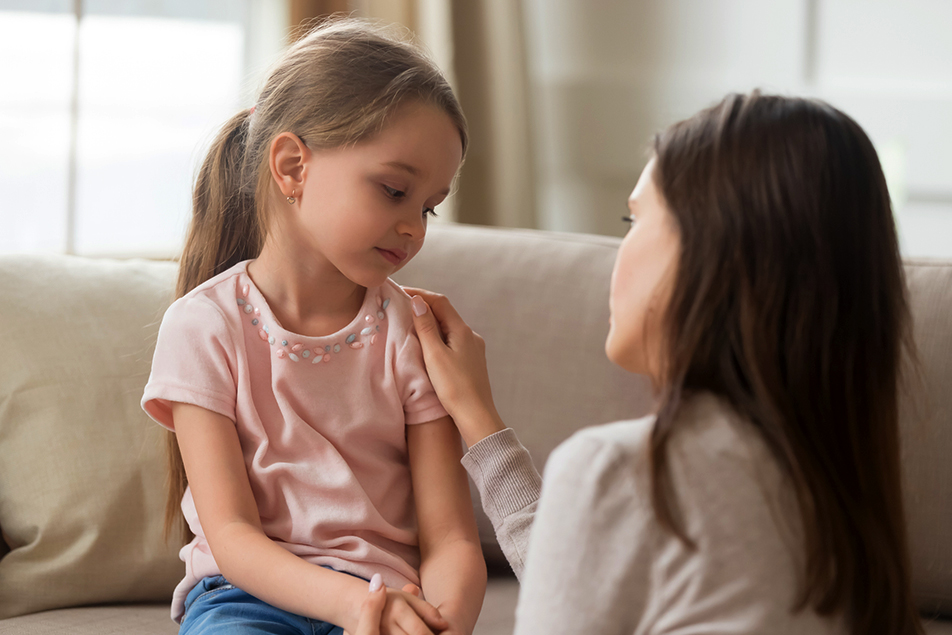
This post was written by Megan Kariger, MS, CCLS, certified child life specialist, Parkview Health.
Children, like adults, experience moments of anger and frustration that can be difficult to diffuse. Children also sometimes have bad days. Younger children especially are still learning how to regulate their emotions and often need help from their primary caregivers in order to calm down. Keep in mind, when trying to get your child to calm down, it’s important that you are aware of the emotion your child is experiencing and that your child is able to identify/is aware of that emotion. Children as young as three can start to recognize emotions and by six they are able to label happy, sad, mad and afraid.
Here are some ways to help diffuse tense situations in the moment. However, it’s important to keep in mind that children can learn to regulate their emotions independently through different outlets and techniques, which you will also find below.
Strategies for diffusing an angry child during an outburst
Stay calm – When your child is angry - yelling, hitting, throwing, etc. – it’s very important to stay calm and not join in. If you start to yell, that may increase the aggressive or defiant behaviors and teaches them that yelling is an acceptable expression when someone’s angry. Try not to take the outburst personally; he or she is still learning how to manage their emotions.
Communicate and empathize – Make sure to label the emotion. This might sound like, “You seem angry because you’re throwing your toys/yelling,” or “You look upset.” Let your child verbalize why he or she is angry. It often helps if you repeat back what your child said to you. Doing this lets your child know that you heard them and are understanding why he/she is upset. This can help de-escalate the situation because it makes your child feel heard and validated. You can then communicate why the angry behaviors are not acceptable.
If your child is still yelling, sometimes whispering or lowering your voice can help, as this models a softer voice. A similar strategy, slowing your breathing can be a great way to get the child to reflect or imitate that calming behavior.
Stand your ground – If you give in to what your child is wanting, you are then encouraging and reinforcing this angry outburst/behavior. Remember to remain calm and let your child know that you understand what they are saying.
Explore solutions and future coping – Help your child let out those emotions in the moment, as well as in the future. Model coping for your child to see and utilize. Some coping techniques that may work for your child could be counting to 10, taking deep breaths, stomping their feet, etc.
Encourage them to come to you when they are struggling or starting to feel frustrated/angry in order to prevent it from escalating.
One of the best ways to diffuse anger in a child is to model ways to cope with emotions before your child is angry such as:
- Counting to 10
- Taking deep breaths
- Stomping your feet
- Doing something active (bouncing a ball, jumping jacks, taking a walk)
- Listening to calming music
- Write down what you’re upset about, then tear up the paper
- Draw on paper (how they feel, why they are angry, and so on), then crumple it up
Reflect on what might be going on in your child’s life that might be impacting their emotional health. Younger children can often become more aggressive and angry when there’s a change or disruption to their everyday routine. Typically, this is something they will not communicate to you due to their developmental age. There could also be triggers within their routine, such as they get upset at bedtime, homework time, etc. If you are recognizing this sort of pattern, encourage your child to help problem-solve ways to make those transitions and routines a little easier.
As children get older, they start to experience more complex emotions, such as pride, worry and embarrassment. It’s possible your child will feel embarrassed about an emotional outburst or worried that you will look at him or her differently. It’s important in these situations to remind your child that we all have bad days, but that you still care about him or her and that the outburst doesn’t change that. If you’re feeling like your child’s anger is out of control, you can always reach out to your child’s doctor as we



